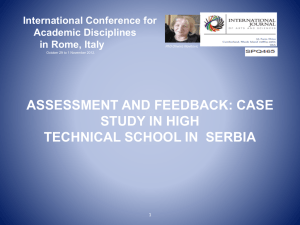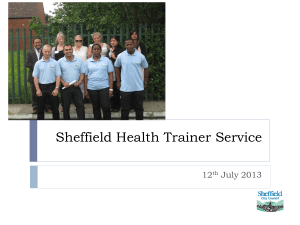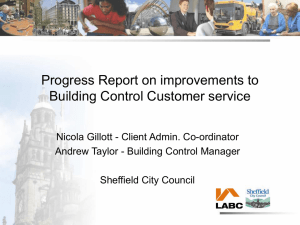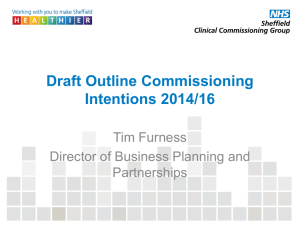Information Overload and Information Poverty Do they impair
advertisement
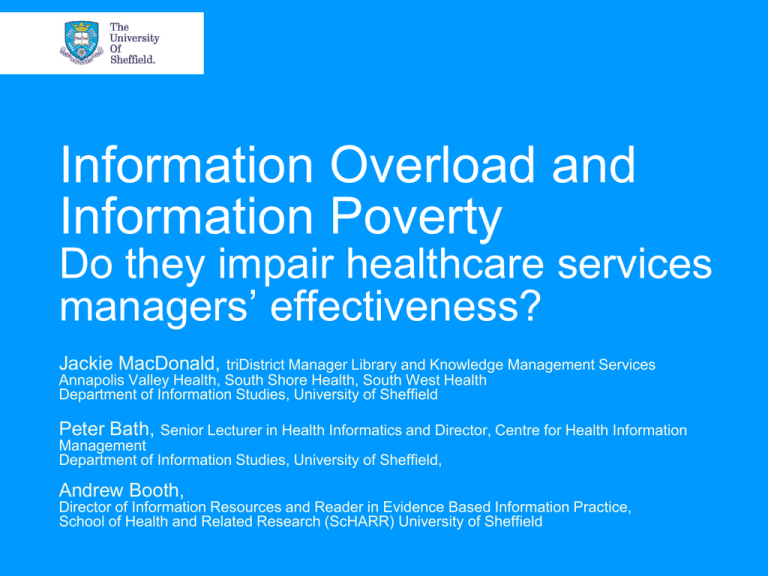
Information Overload and Information Poverty Do they impair healthcare services managers’ effectiveness? Jackie MacDonald, triDistrict Manager Library and Knowledge Management Services Annapolis Valley Health, South Shore Health, South West Health Department of Information Studies, University of Sheffield Peter Bath, Senior Lecturer in Health Informatics and Director, Centre for Health Information Management Department of Information Studies, University of Sheffield, Andrew Booth, Director of Information Resources and Reader in Evidence Based Information Practice, School of Health and Related Research (ScHARR) University of Sheffield Contents •Brief overview – the study and literature •Information quantity frameworks (too much or too little) •Information quantity as a reason for Satisficing (making decisions with “just enough” but not ALL the information wanted) The Literature Review • Most LIS studies are of scholars – faculty and students • There are few studies of managers in general • Very few studies of healthcare managers’ information behaviour – I found only 3 © The University of Sheffield 4/13/2015 Study overview • Qualitative, exploratory interview study • Multiple case study • Critical incident technique plus general questions • Data analysis: transcribed interviews indexed and compared using NATCEN ‘Framework’ • Participants • 17 healthcare services VPs, directors, managers and other leaders; 2 health board members • post secondary education: 19; graduate degrees: 11; undergraduate degrees: 4; registered health professionals: 12 • Mean participant age: 51years • Mean healthcare career length: 21 years 4/13/2015 © The University of Sheffield Satisficing • “I probably didn't access all the resources that I could have accessed simply because of the timeframe … I would say … not 100% satisfied …I think I did an ok job.” (Manager) • There is also a time sensitivity to this so the other maxim is a decision on time is better than the right answer too late … (Senior Executive). © The University of Sheffield 4/13/2015 The effect of information load on decision time and accuracy (Iastrebova, 2006) © The University of Sheffield 4/13/2015 Information Poverty • Chatman, 1995: 6 propositions Information Overload • Iastrebova, 2006: 7 part definition • Britz, 2007: 6 variables Common issue: Information infrastructure gap © The University of Sheffield 4/13/2015 Information Poverty: 3/6 Chatman’s 1996 Propositions Supported 1. The needed information did not exist …we get almost no information … (Senior Executive) ... I can never get the level of detail I need. (Other Leader) 2. If it did exist, it would be hard to get I ask for [data] … and they always forget to send it to me. (Other Leader) They keep a lot of information - to get it from them may not be that easy ... (Manager) 6. New information was introduced as needed I don't spend a lot of time looking for information if … it is not going to change any decision that I make. (Senior Executive). 4/13/2015 © The University of Sheffield Information Poverty: 4/6 Britz’ 2007 Variables Supported 1. The information needed would not be available; if available was not always credible Trying to find something that is specific … to the situation ...is very difficult ... (Director) I don't always feel that our data is reliable and valid ... (Other Leader) 2 & 6: Lack information infrastructure and materiel means We don't have a good reporting framework for the indicators ... (Senior Executive) 3. Linked to literacy, particularly information literacy … my level of computer skill … is the biggest barrier (Manager) We don’t have ... much information and are not 100% sure of what it means. (Director) © The University of Sheffield 4/13/2015 Information Overload: 3/7 Iastrebova’s 2006 Definitions Supported 5. Time needed to process the information exceeds available time … because of time restraints we do limit information that we gather, and we limit the possibilities in terms of decisions that we make… (Manager) 6. More information is received than wanted or needed to function effectively Can I get through those thirty papers? Oh my ... I can't do that ... (Director) 7. Information processing requirements exceed available mechanisms I can't possibly keep track of all of it (Director) © The University of Sheffield 4/13/2015 Conclusions • Information poverty and information overload are both likely factors in participants’ decision to satisfice • They need and look for internal information to help set context when solving problems and making decisions but are challenged by an inadequate information management infrastructure – a variable common to both concepts For further study • Do they experience both overload and poverty in single decision situations? • Is expert information sharing a coping strategy in both situations? © The University of Sheffield 4/13/2015 Thank you. Questions?

